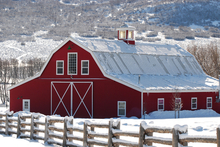Horseback riding is often one of the joys of the winter season as new and beautiful vistas of snow-covered hills and fields open to view around every turn and corner. Unfortunately, the beauty of the season is often overshadowed by riding accidents that affect the life and limbs of both rider and horse.

Safety tips for holiday horseback riding
An unexpected icy patch, a hole covered over by snow, or a jostled tree branch that drops a load of snow on an unsuspecting horse spooking it can lead to accidents and injuries.
An unexpected icy patch, a hole covered over by snow, a jostled tree branch that drops a load of snow on an unsuspecting horse spooking it can all lead to accidents and injuries.
Although reliable statistics about the injuries suffered while riding are difficult to find, statistics from 2009 show 14,466 injuries related to horseback riding, so a few precautions to make sure riders take positive steps to avoid injuries are in order.
Here are some tips from the American Academy of Orthopedic Surgeons (AAOS) to prevent horseback riding injuries during all kinds of weather:
- All riders should always wear horseback riding helmets that meet proper safety standards.
- Wear properly-fitted, sturdy leather boots with a minimal heel. Your clothing should be comfortable and not too loose.
- Inspect all riding equipment to make sure it is not damaged.
- Be sure the saddle and stirrups are appropriate to your size and are properly adjusted.
- Secure all riding equipment properly.
- Children and novice riders should consider using safety stirrups that break away if a rider falls off the horse.
- Novice riders should take lessons from experienced instructors.
- Young horseback riders should always be supervised.
- Amateurs should ride on open, flat terrain or in monitored riding arenas.
- Jumps and stunts require a higher level of riding skill. Do not attempt these without supervision.
- If you feel yourself falling from a horse, try to roll to the side (away from the horse) when you hit the ground.
- Do not ride a horse when you are tired, taking medications, or under the influence of alcohol.
- Always remember that you are riding an animal that has its own reactions to the sights, sounds, and smells you are both experiencing.
- Horses are flight animals. They will run away from sudden noises and movements. Stay alert for anything that might startle your horse. Be prepared to respond quickly.
- When trail riding, do not go off trail, no matter how tempting. Heed warning signs.
- Never walk behind a horse. It is best to approach them at their shoulder. This is less threatening to them.
To gauge a horse's demeanor, watch the horse's head, particularly its ears. The ear movements of a horse will provide you with information about how the horse is reacting to its environment, people, or other animals. A horse will direct one or both of its ears toward a sound. Ears held the side can indicate that a horse is sick, sedated, or sleeping. Ears that are pinned back indicate anger or a threat.
If you are giving the horse a treat, be sure to keep your hand open and your fingers extended and flat. Horses can inadvertently bite and break fingers that are cupped around a treat.
Accidents related to icy and snowy conditions can occur more frequently and be more serious than those suffered at other times because of treacherous ice-covered trails, streets and lanes. Being alert to conditions and properly prepared for the weather can save both horse and rider from regrettable actions that might endanger both.
